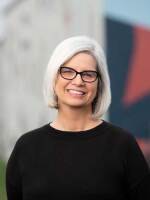The latest attempt to keep tar sands crude out of South Portland has taken a step forward. The city council there voted last night to approve an ordinance barring the bulk loading of crude oil for export and construction of facilities needed for that.
By a vote of 6-1, the South Portland City Council has given initial approval to an ordinance that will prevent the loading of raw crude oil onto marine tankers. Its passage on first reading follows a divisive referendum last fall to reject an anti-tar-sands ordinance that critics said was too broadly written. But after a public hearing that lasted nearly four hours and the work of a draft ordinance committee that took many months, several councilors said they are convinced this is a good compromise.
"I think that this ordinance is a lot different than what we voted down in November," says Linda Cohen, a member of the local chamber of commerce. "I think this narrows things down."
Cohen voted against the Waterfront Protection Ordinance last fall and supports the new measure, dubbed the Clear Skies Ordinance. She says as a councilor her duty is to protect public health and safety.
"I think as city councilors our responsibility is to protect the citizens of the city, protect the assets of the city, and all the assets of the city include the residences, businesses, homes, the land, the water around us," she says. "It's beautiful. Why would we want to put more risk here than we already have?"
Supporters of the Clear Skies Ordinance say it will not hinder any current activities on the South Portland waterfront because the oil industry only currently loads refined oil products onto ships, and because imports of crude will still be permitted. But Councilor Michael Pock, the sole vote against it, says he doesn't like the idea of essentially overturning last fall's referendum.
"If our vote doesn't count, what good is it to have votes?" he says.
An attorney for the Portland Montreal Pipe Line Co. declined comment after the vote. But in his remarks to the council, Matt Manahan said "there is no logical basis to segregate unrefined versus refined oil." Manahan says it makes no sense and he thinks legislators shouldn't vote for things that don't make sense.
But, Mayor Jerry Jalbert says, "as we go forward, if we find some parts of it are too restrictive, there can be changes that occur in the future."


